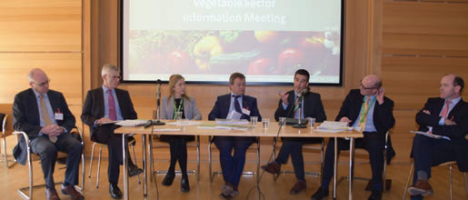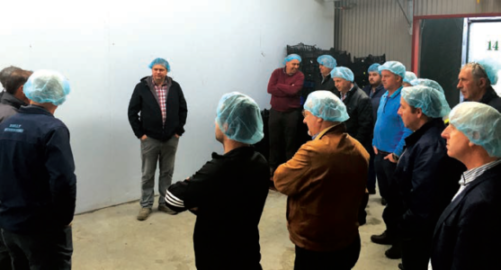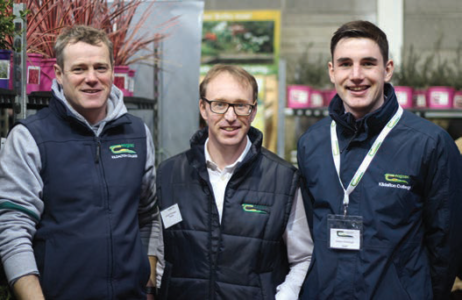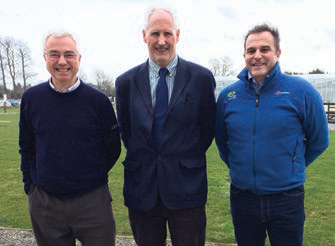New momentum for producer organisations An information meeting on producer organisations organised by DAFM was held in Backweston, Celbridge, Co Kildare on the morning of 6 February. This meeting was primarily aimed at non-producer organisation growers and other interested parties, who wished to learn more about the potential value and benefits of participating in producer organisations. This meeting was the first of a series of proposed meetings, to facilitate a better understanding of the producer organisation scheme. The follow-up workshops will take place shortly at the Department’s Backweston campus involving discussions between interested producers, representatives from the two existing POs and DAFM. The aim will be to facilitate further information sharing about the structure and operation of POs and potential benefits and opportunities that exist through participation in POs. ✽ |
Nursery stock meetingThe spring nursery stock meeting was held in Portlaoise on 7 March. It was very well attended and a lot of good discussions followed, in particular in relation to damage from Storm Emma and a new plant health initiative. Sinéad Kelly from the Department of Agriculture gave an overview of the bacterial pathogen, Xylella fastidiosa. Neil Helyer from Fargro covered IPM strategies for the coming season and introduced some new pests to watch out for. Andrew Wilson discussed the precise use of controlled release fertilisers and finally Dónall Flanagan, Teagasc introduced the Irish Plant Health Initiative. This was developed by the Department of Agriculture, Teagasc, the Irish Hardy Nursery Stock Association and Bord Bia. It sets out five actions growers should take to improve their response to plant health concerns, not least Xylella. Growers can sign up to the scheme, using it to improve their biosecurity and to build customer confidence. See the |
Mushroom growers embracing Lean Farm Programme The Commercial Mushroom Producers Organisation has launched the Lean Farm Programme for mushroom growers. Lean is about driving continuous improvement to enable businesses to be operating more efficiently. A lean pilot programme was introduced to the mushroom sector in 2016 as the industry faltered following Brexit. The pilot programme was a success with savings identified in the areas of product giveaway, harvesting, growing, energy, people management, planning/forecasting and benchmarking. CMP (commercial mushroom producers) have taken the initiative by Incorporating lean into their operational programme and have achieved EU grant aid approval to roll out a lean farm programme to any mushroom farm who wants to introduce lean practices. Teagasc is taking a lead role in the Lean Programme by organising and coordinating the programme and also by doing an assessment on each unit to identify the strengths, weaknesses, opportunities and threats. So far, nine farms have started the lean programme with eight more farms ready to sign up. The programme will run up until the end of 2018 with the aim of continuing the programme into the future. ✽ |
IHNSA Trolley Fair at Kildalton College On 27 February, Kildalton College hosted the first of this year’s trolley fairs organised by the Irish Hardy Nursery Stock Association (IHNSA). The threatening weather that was forecasted may have impacted numbers attending but it did not hinder the energy and success of the event. Over 30 nurseries and horticultural suppliers exhibited at the event and over 150 visitors from the horticulture industry attended. There was a wide variety of plants on display ranging from trees, shrubs, herbaceous perennials, alpines, roses and bedding. The quality and variety of plants were extremely high and this reflected the high standards and quality that Irish nurseries practice. The IHNSA trolley fairs provide an ideal opportunity for wholesale nurseries to showcase their plant ranges and selections for the upcoming season. They also provide an opportunity for garden centres, landscapers and other horticultural professionals to place orders, network with the various nurseries and view the various plant ranges on offer. ✽ |
AppointmentsIn November 2017, Teagasc appointed Ivan Donnelly as Horticulture Technician, the latest member of the horticultural staff at Kildalton College. He replaces Brian Lyons who retired after over 40 years of service at the college. A native of Wexford, Ivan graduated with a BSc in land management (horticulture) Level 8 in 2017. He previously worked for John B Dockrell Ltd where he was the trainee salad production manager. Ivan’s new role will consist of teaching students in the fundamentals of commercial fruit and vegetable production as well as the management of the college’s fruit and vegetable unit. ✽ |
EventsOne of the events being run for the industry is the berry seminar to be held at the Teagasc centre in Ashtown on 18 April. A number of excellent speakers have been lined up including the following: Johan Alterman from the Italian soft fruit propagation nurseries, Salvi Vivai, Mazzoni and CIV will give us a technical briefing on their strawberry cultivars with the emphasis on best production practices. Keeping with the plant theme, Kees Van Giessen from Holland’s largest soft fruit propagator (Van den Elzen Plants) will talk about their propagation business, new strawberry cultivars with an emphasis on the production of ‘Malling Centenary’. Combined with this will be a technical update on the soft fruit research programme in Teagasc by Eamonn Kehoe, followed by an update on spotted wing Drosophila (SWD). Lorcan Bourke from Bord Bia will give the latest marketing insights into the berry sector in Ireland. ✽
|
Fusarium meeting at Ashtown An unusual meeting took place at Ashtown on 16 February. Unusual in that only one small group of growers were invited – lettuce producers – and also for that fact that only one topic was on the agenda – Fusarium wilt disease. The aim of this well-attended meeting was to bring growers up to speed with this deadly disease which has struck at the heart of the lettuce industry in Rush, Co Dublin. Fusarium, which is a soil-borne disease that causes a wilt in lettuce, has broken out in the past season on several nurseries in Rush. The problem with this pathogen is its persistence in the soil and difficulty of control. One of the speakers, John Johnson of Enza Zaden, did hold out hope that resistant varieties will be developed to counter this intractable disease. But that’s some years away. More immediate results may come from soil sterilisation. Alan Horgan, technical manager with Certis, outlined the benefits of sterilisation by treating the soil with Basimid. He emphasised to the growers present the importance of the correct application of the product to obtain the best effects from it. And Teagasc foliage specialist Andy Whelton posed the question “Is there life after lettuce?” He made the point that there are alternatives to lettuce and cut flower production was one of them. Based on trial work at Kildalton College, Andy recommended that stocks and ornamental brassicas might be possible replacements for a grower looking to produce something different. ✽ |






